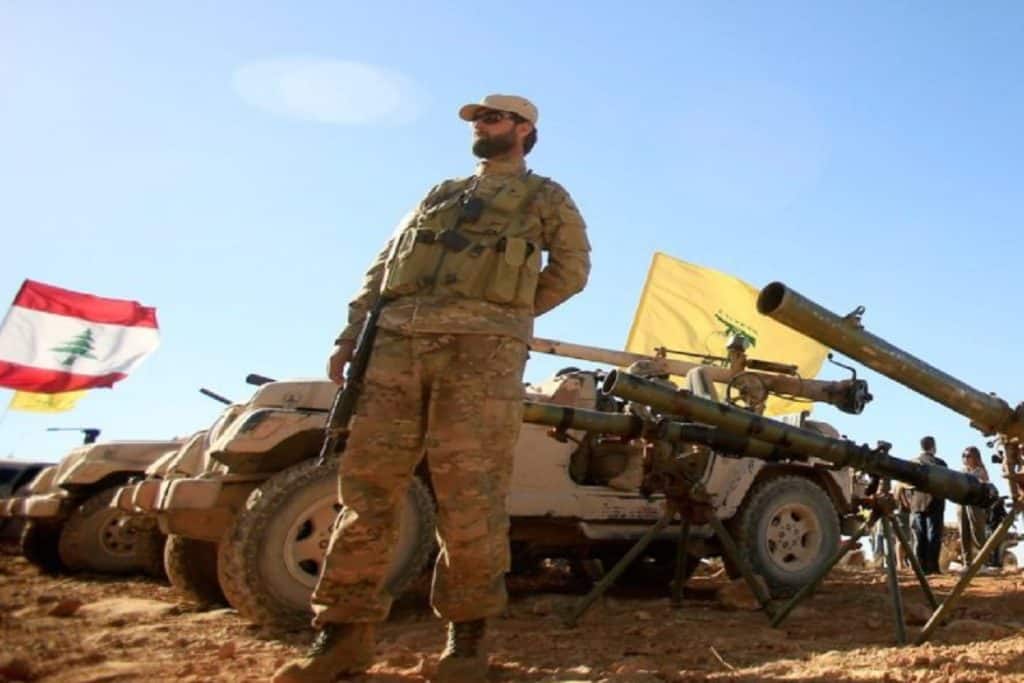By Denis Korkodinov
The Hezbollah political movement has become an indispensable political figure capable of managing global processes. Hezbollah leader Hassan Nasrallah has largely challenged Washington and Tel Aviv, threatening them with hostilities. This was a peculiar lesson to the world community, which is trying to impose its own rules of conduct, which Hezbollah refuses to comply with.
 Especially for World Geostrategic Insights, we talked about this with Ali Yehya, Lebanese political analyst and specialist in transnational challenges.
Especially for World Geostrategic Insights, we talked about this with Ali Yehya, Lebanese political analyst and specialist in transnational challenges.
1. The confrontation between Israel and the Hezbollah movement is likely in the near future to risk escalating into an open armed conflict. So, according to the Israeli press, Hezbollah is rapidly pulling its armed forces and heavy artillery towards the Israeli borderand, above all, to the Golan Heights. For its second year in a row, Tel Aviv has been implementing a four-dimensional strategy of “combined battle”, preparing for a possible war with Hezbollah. A distinctive feature of the current period of escalation of the conflict is that the parties do not conceal their goals to start military operations against each other, which is greatly facilitated by the US-Iranian tension, in which Hezbollah and Israel are on opposite sides of the barricades. How likely is the war between Israel and Hezbollah, in your opinion? What role does the government of official Beirut play in this conflict? Has Israel exaggerated the role of Hezbollah in the military-political processes taking place in the countries of the Middle East?
– The unpopularity of Israeli politics imposed by force in the region was the main reason for the formation of Hezbollah. This gives rise to the movement of the leader Hassan Nasrallah to criticize Tel Aviv. For example, Nasrallah’s speech, made on December 7, 2018, was directed to the “heart” of Israel, defining a coastal strip 60 km long and 20 wide and 1,200 km long, as part of Hezbollah’s sphere of influence. This includes all major government centers, the Israeli Ministry of War, Ben-Gurion International Airport, domestic airports, industrial and commercial clusters, the Israeli Stock Exchange, and major power generation and conversion stations. According to Israeli sources, more than 12,000 Hezbollah missiles are currently aimed at Israeli territory. The movement is active in the Syrian Golan along with the Syrian security forces. But due the Israeli bombing, it has not yet completed the creation of infrastructure in the region to prepare for the next confrontation
Hezbollah is an active player in the countries surrounding Palestine ( the leader of the Hezbollah cell in Egypt, was arrested and released shortly after the collapse of the Mubarak regime in 2011), as well as in Sudan and Jordan. In Iraq, the movement takes part in the training of the local militia, while in Yemen it takes the side of the Hussites.
The threat of escalation of the conflict between Hezbollah and Israel is extremely high, given that they are irreconcilable enemies of each other. Any occasion can be used to start hostilities. However, the parties to the conflict are awaiting the reaction of the international community. And as soon as the leaders of certain countries will make official statements, which can be interpreted as a call to war, Hezbollah and Tel Aviv will begin active actions.
Therefore, the possibilities of Hezbollah are not at all exaggerated. The movement has enough forces and means to influence the global processes.
2. In February 2019, Russian Ambassador to Beirut Alexander Zasypkin officially announced that US policy with respect to Iran could provoke a new war between Israel and Lebanon, while defending the Hezbollah group supported by Iran. Does this mean that relations between Hezbollah and Russia are, on the whole, neutrally benevolent, given that even the leader of Hezbollah Hassan Nasrallah has a positive attitude towards Russian President Vladimir Putin?
– Relations between Russia and Hezbollah for the first time attracted close attention after representatives of the movement took an active part in the liberation of Aleppo in 2016. Among other things, the Russian command has repeatedly appealed to Hezbollah for help in training military personnel in Syria and Iraq.
As for Lebanon, Russia from the very beginning took into account the specifics of our country and its western neighbors.
3. Not so long ago, the United Kingdom issued an ultimatum to Beirut demanding the banof the Hezbollah movement in Lebanon. Otherwise, the British government threatens to cease financial assistance. I understand that the Lebanese government is likely to ignore the English ultimatum, since Hezbollah is inseparable from the political life in Lebanon, but still, when it comes to money, many politicians change their minds. Is there a possibility that Beirut, under the threat of economic sanctions, will limit Hezbollah’s activities on its territory, even if it creates the conditions for a civil war in Lebanon? Does Beirut have methods to neutralize threats from the UK?
-We can go back to what British Secretary of State for Foreign Affairs Alistair Bert said during a recent Middle East tour. He said British-Lebanese relations would not be affected by any British stance on Hezbollah. At the same time, British support is limited to the modest assistance of the Lebanese army and security forces, as well as Syrian refugees.
Regarding pressure to impose sanctions on Lebanese banks, Hezbollah is not connected to the banking system, but is present through people who have official and legal commercial institutions. Banks are interested in protecting these people because they are legal depositors, whether they are individuals or legal entities. They always strive to deter them from any suspicion of their relationship with Hezbollah.
The banking system is also part of the property of the Lebanese people and, therefore, excludes civil war, since the strongest military potential is the guarantee of not participating in any civil war.
4. Lebanon is often called the “Arab Switzerland”, because it traditionally serves as an international platform for financial and political transactions. So, it is in Beirut that, as a rule, world politicians and diplomats regularly gather to solve behind the scenes certain problems relating to the Middle East or the Persian Gulf. Is it really? Is Lebanon “Arab Switzerland”?
– Lebanon has lost some of its influence, despite the fact that it is deservedly called the “Arab Switzerland” for the reason that it still proceeds from the provisions of bank secrecy similar to that used in Switzerland. In addition, Beirut has lost part of its tourism role as a result of successive crises and the repeated prohibition of some members of the international community from visiting Lebanon.







